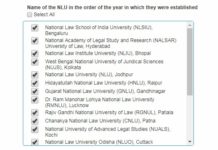This article has been submitted by Kaustubh Chaturvedi for the CLATGyan Blog Post Writing Competition. If you think this article is a good read, ‘Like’ this article on Facebook (the button is at the bottom of this piece) or post a comment using the ‘comments’ section below.
***
While the driver tried to navigate the pothole-ridden Lucknow-Allahabad highway with no mean degree of success, a battle raged in the sky. Heavy rainfall threatened to douse the sun, only for it to break out again and again. This was, alas, a pyrrhic victory, for it seemed to the occupants of the car that it had sacrificed its best qualities to regain its position as the overlord of the skies, a position it had presently ceded to the most ominous looking thunderclouds. The sun that emerged, scarred and combat-weary, was not the bastion of warmth, hope, and optimism that so frequently populates storybooks. Instead, it burned into Vikrant’s eyes, inducing a searing pain. He turned his head to the side, for he could not look upon it directly.
The day had been one of revelations, and now he chose to drown himself in the heavy chords of Pink Floyd rather than ponder over them. That was, after all, the only natural thing to do, for it is in the disposition of eighteen year-old boys to run away from any and all moral dilemmas. Sadly, his bright pink walkman – a gift from his uncle; the man had a terrible sense of humour – refused to assist him in this rather cowardly endeavour, and promptly died. He swore very softly under his breath, cognisant of the half-asleep figures of his mother and his sister. The driver chuckled – he’d heard him quite clearly, and it gave him some pleasure to see this sharply-dressed young man utter the same chaste Hindi word that he himself used with great frequency and with a perplexingly large variety of connotations.
Vikrant’s mind, meanwhile, drifted back to the maelstrom of emotions he’d left behind him in Allahabad. With no music to gain temporary relief from, his mind was solely occupied with the haunting image of the woman he’d left behind. The eighty year-old shell of a woman, all bones and no flesh. She was but a shadow of what she had once been. She looked nigh on unrecognisable in photos from her youth; an exquisitely striking woman whose graceful appearance masked the mind that had perhaps always been, in some form, or the other, twisted. And yet nobody could call her a fool. In fact, she possessed nearly abnormal intelligence, funnelled almost exclusively towards manipulation, lying, and other such spite-fuelled activities. Her motivations were nearly incomprehensible – maybe she sought to stay on everybody’s good side all the time, or maybe she had an inferiority complex which she overcompensated for by trying to continuously exert her own superiority in the worst ways possible.
There are certain people who, born on the wrong side of the tracks, are able to utilise sheer will power and ability to ensure they die on the right side. The success stories. Such people are worthy of admiration, and it is they we discuss most frequently as a society. Vikrant’s grandmother belonged to another category altogether. She was born with a silver spoon in her mouth, and after spending her youth in great comfort she married a marine superintendent and continued to live in great comfort. She had two sons, both of whom did well in life. Her husband was a man of great character, and doted on her – indeed, his greatest vice was that he was perhaps a little too infatuated with her, to the point that he let that infatuation compromise his better judgement.
It was here that things slowly started going askew. She was the primary influence on her children as they grew up, since her husband spent most of his time sailing. For some unfathomable reason, she would always try to play the boys against each other, make them compete for her affection. Perhaps she was under the impression that this gave her power over them, power which would remain even when they grew up. She could not have been more wrong.
Her younger son was now dead, killed by the same cancer that was now burning through her body. And her elder son held her in contempt. He used his wife as a shield, saying that she would not permit him to bring his mother to his own home and get her properly treated. Instead, he took her money, claiming it was required to fund her treatment, and then admitted her into mediocre hospitals. In essence, he was bleeding his own mother dry. His wife went so far as to shift the sole air conditioner in the house to the guest bedroom so that she could sleep in peace, while the silently suffering old woman bore the indignity of being looted by her own son in silence. Maybe she realised it was karmic retribution of sorts, retribution for the way she treated her younger son’s family. That did not make it sting any less.
She had met Vikrant after four long years that day. It had been four years since her son passed away, and she had after that ignored all calls by her conscience to take care of her younger son’s family due to practical considerations. What if they needed money? Not worth it. And so she managed to stay true to her lifelong motto of practicality, even prioritising money over people. She did not realise what she was missing out on till she met them that day. Vikrant in particular seemed to her the spitting image of his father, her son. Seeing him brought back to life all that she had pushed to the back of her mind. All of a sudden, she remembered the good old days, when they had lived happily as a family. At this thought she started to cry, as old women full of regret are likely to.
Vikrant, for his part, did his best to empathise, but even for someone as naturally kind as him it was difficult. After all, this was the woman who had deserted his family and him in their hour of need, the woman who had always tormented his mother to the point of destroying her self-esteem. There was a lot of residual anger inside him, even though he never admitted as much. Even as she cried; a shuddering, helpless thing he wondered whether she was only pretending. After all, he had never seen anything but crocodile tears and love for her own self from her.
He did not realise that she was in fact crying for selfish reasons. She wept because she remembered what once was, and how it had all come to nought, leaving her living alone in a dilapidated house with nobody to love her and keep her company. How did it ever come to this?
As Vikrant and his mother got up to leave at the end of an emotionally draining day, she held them to her bosom as if she was reluctant to let them go. She probably was, for she was an old woman now, and this was one of the few pleasures her life still had left. With Alzheimer’s gradually setting in, it was unlikely she would remember her own grandson when he next visited. If he next visited. As their car drove away, she could barely see them through the mist of tears that had clouded her vision. She would never see them again.
A particularly jarring pothole suddenly snapped Vikrant back to the present. His mother was still asleep, but even in her sleep she looked uneasy. She too was having nightmares. This trip had taken a toll on her gentle psyche. She had every right to hate her mother-in-law, but she no longer did. She now had nothing but sympathy for her. Vikrant had teased her for being too soft-hearted when she had told him this, but now, he realised he felt the same. All his anger had melted away, and had been replaced by a deep sadness and sense of sympathy. Nobody deserved to live like this. Hell, nobody deserved to die like this; without a single person to call your own, a single person to hold your hand and take care of you as you breathed your last.
He’d always thought that there were only two ways of dealing with anger – either you swallow it, or you take it out on somebody. He had been wrong. True forgiveness did exist. His grandmother had done nothing to merit his absolution. Despite that, he knew now that he had forgiven her. This gave him immense peace of mind. He didn’t know that his forgiving her had been inevitable. It is impossible to hate someone who is suffering so much already. For the first time since his father’s death, he was at peace.
Within a week, she passed away. It was a red sun that day, but it seemed to emanate hope and peace. As it set that evening, Vikrant looked at it and smiled. And then he embarked upon the rest of his life.
***
Kaustubh Chaturvedi is a professional procrastinator, lover of food and purveyor of staircase wit (besides being a law school aspirant) from Dehradun.















Kausy! You finally got published!
You deserve to win. The other articles can’t hold a candle to this one.